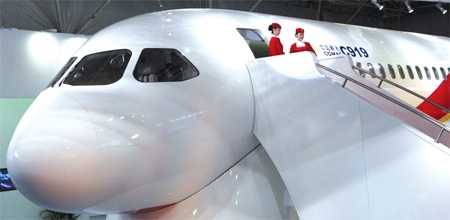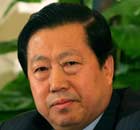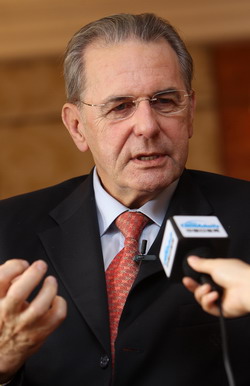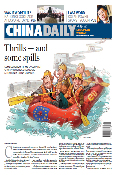An exclusive interview with IOC's Rogge
Updated: 2010-11-14 12:38
(chinadaily.com.cn)
Belgian Jacques Rogge, president of the International Olympic Committee, took an exclusive interview with China Daily in Guangzhou while attending the ongoing General Assembly of the Olympic Council of Asia (OCA) on the sidelines of the 16th Asian Games.
Q: You attended the opening ceremony for the Asian Games last night. How do you think of it?
A: I think it was absolutely fantastic opening ceremony. It was technically very well. There were a lot of emotions, a lot of startling beauties. And I like also very much the activity in using the water and using the river and also the backdrop of the city behind the scene. It was very nice.
Q: Compared with the opening ceremony for Beijing Olympic, which one do you prefer?
A: It's like you ask a father to him you ask compare his different kids. You cannot compare different opening ceremonies. You cannot compare Guangzhou with Beijing, you cannot compare Guangzhou with other cities. Let me just say this is a unique and good opening ceremony.
|
|
Q: You've been here in Guangzhou since Thursday night. How do you think of the organization here?
A: I think it's going to be very good organization. Like always, you can only judge the organization until the last day. So it's too soon. But I'm very confident that I know my Chinese friends are masters in organizing major events, and definitely, sports events. So I'm totally confident.
Q: Do you think the legacy of the Beijing Games benefit Guangzhou as well?
A: I think the Beijng Games has left great legacy for your country. It left the legacy on human and alert of sports has really anchored very deeply in the Chinese society. There is also great urban legacy for Beijing as well as the other cities that participated in the preliminary for football.
There is also great legacy in environment and climate in Beijing itself All the China will be benefit from it.
Q: Do you think Guangzhou is qualified for hosting an Olympic Games?
A: I'm expecting that question. I think GZ definitely has the skill to do that. I think definitely GZ will have the experience and expertise from these games. On what if it will become an Olympic city, it's something that to be to be dependent on my Chinese friends, not on me.
Q: Now more and more Asian countries are rising as sports powerhouses. What kind of role do you think the Asian Countries play in the world's sports stage?
A: In 2004, at the end of the Athen Olympics, at the final press conference, the media asked me what are the conclusions from the Games, I said two things. I said that, first of all, these games will be unforgettable because it's very well-organized. And I said that we saw the rise of the Asian continent in sport. There are great performances, not only by China, but also by Japan, Korea, Thailand This has been confirmed in Beijing. Your country is No 1 with 51 gold medals. This will also continue in London, I'm quite sure. There are good reasons for that. The reason are straightforward. Asian is the most populous continent in the world and population is important in sport. The bigger population you have, the more the chances for those good results.
Secondly, Asia is now economically becoming very strong. There is third reason that many cities are expanding see sport as a way to intelligently expand the size. Add to that, the very good sports system in your country and the great quality of your sports leaders. Those are the reasons for your results.
Q: IOC is now focusing on fighting against bribery. China's soccer is trapped in bribery scandal as well recently. Do you have some comment on that?
A: This is not acceptable. Bribery in sports is not acceptable. The IOC has taken very strong measures against that. Since long time ago, we have a very strong ethics commission, we have total transparency in terms of account ability up to the last dollar. Everything that we have is totally accounted for. So there is no mystery and everyone can come and look into our account. I think that's very important. Sports have a moral duty to make sure that there is no corruption.
Q: Concerning the anti-doping campaign, do you think IOC has handled the drugs right?
A: I think we did a very good job. Doping will never completely disappear in sport because cheating is inevitably a human nature. If you look at the society in general, we always need to have police, we always need to have a court of justice, we always need to have jail unfortunately because crime in society will never disappear. Out duty is to squeeze doping at as low as possible level and I think we have achieved that,
Q: We had a very successful Youth Olympic Games in August. How do you think of the future of the Youth Olympics?
A: I think the Youth Games have a bright future. I believe very much in the idea that we need to give the educational value to the Games. The Youth Games is different and it's not just about medals. There are medals. There is competition. They are the best athletes of their generation between the age of 15 and 18. But besides that we give them a huge program of education, not only for sport but also for life. And we give them a great cultural program, which they embraced with a lot of interest. That's the unique factor.
Q: Is there anything to be improved?
A: In the life, everything can be improved in all aspects. Yes, of course, we have to look at the whole organization. The organization was very successful, but you can always learn for the future. You have to be humble and modest until you have achieved the final result.
Q: What do you believe is your biggest achievement so far since you took the position of IOC president in 2001:
A: It's very difficult for me judge. I think my major achievement is that I have remained myself. I have not changed and I remained the same man as I was before I was elected. I think I would like to tell people to understand that I take the task very seriously, that I work hard, that I want to do this for sport and humanity. Remaining myself, that something I think it's the most important because sometimes people get into high position, they get carried away. They change their behaviors. I don't want this.
Q: There are still three years to go in your terms of presidency. In which aspect do you think you can still work more?
A: You never can be complacent and you never believe that you have done enough. You have to continue to do more and more. Sports people are perfectionist and I'm a perfectionist. I strive for perfection. Even though I know that perfection can never be reached. We have to continue to work on the quality of the Games, to grow the Youth Olympic Games and develop it. We have to continue to fight against doping and illegal betting. We have continue to strength the values of sports.
Q: Do you have the plan after your retirement? What do you want to do?
A: I have thousands of plans. Individual who cannot dream any more, who have no plan, is a sad thing. I still have a lot of things to do. But they are private.
Paper's Digest

Chinese jet takes on Big 2
First large commercial plane set to ride on demand for aircraft as economy grows.
Super-CPU only for domestic eyes
Specials

Chinese jet takes on Big 2
First large commercial plane set to ride on demand for aircraft as economy grows.

Gaining ground
Doing business in china for westerners has come a long way, Peter batey says.

Safeguarding environment a priority
China continues to face mounting pressure to curb environmental degradation, despite progress in reducing pollution over the last five years, the environmental protection minister warned.

